19 February 2025

African scientists awarded the 2024 EMBL-UNESCO residencies share their experience in bioinformatics and virology, emphasising the power of connections and knowledge exchange.
CONNECTIONSPEOPLE & PERSPECTIVES
2025
connectionspeople-perspectives
5 July 2023

Enabling researchers worldwide to share and analyse pathogen data generated across the world
SCIENCE & TECHNOLOGY
2023
sciencescience-technologytechnology-and-innovation
15 February 2023

EMBL Hamburg’s Sample Preparation and Characterisation (SPC) Facility offers scientists access to almost all available biophysics technologies. The facility’s staff provides advice and support with experiments and data analysis. The facility is conveniently located just next to the EMBL…
LAB MATTERSSCIENCE & TECHNOLOGY
2023
lab-mattersscience-technology
20 December 2022

The first cohort study linking data across categories was recently added on the Pathogens Portal Cohort Browser and is also accessible from the BioSamples browser. This pilot study comes from Erasmus Medical Centre through the ReCoDID project, one of the COVID-19 Data Platform supporting…
2022
updates-from-data-resources
7 December 2021

RNA vaccines, such as the ones for COVID-19, represent a new approach in vaccine technology. Cy Jeffries, faculty staff scientist at EMBL Hamburg, explains the clever technology behind RNA vaccines, and how structural biology contributes to its development. EMBL Hamburg collaborated on several…
SCIENCE & TECHNOLOGY
2021
sciencescience-technology
14 October 2021

Largest in-depth analysis of genomic data tracks the spread of SARS-CoV-2 lineages in England.
SCIENCE & TECHNOLOGY
2021
sciencescience-technology
7 October 2021

EMBL will host a conference to look at the state of the pandemic, lessons learned, and ways to improve pandemic preparedness. Here’s a sneak peek into what promises to be another interesting and informative EMBL conference.
SCIENCE & TECHNOLOGY
2021
eventsscience-technology
10 August 2021
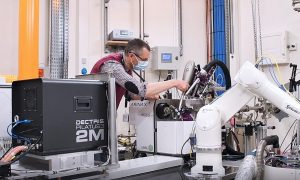
MASSIF-1, run jointly by EMBL Grenoble and the ESRF, is a beamline for macromolecular crystallography. It is used by the research community to study the 3D structure of proteins, which is important for drug development.
LAB MATTERSSCIENCE & TECHNOLOGY
2021
lab-mattersscience-technology
27 July 2021
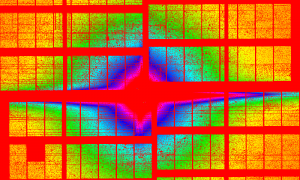
A collaboration led by EMBL Hamburg’s Svergun Group used small-angle X-ray scattering (SAXS) at the European XFEL to obtain data on samples containing coronavirus spike proteins and antibodies that bind them.
SCIENCE & TECHNOLOGY
2021
sciencescience-technology
31 May 2021

The largest in-depth analysis of genomic surveillance data mapping out the dynamics of 62 lineages of the SARS-CoV-2 virus.
SCIENCE & TECHNOLOGY
2021
sciencescience-technology
27 April 2021
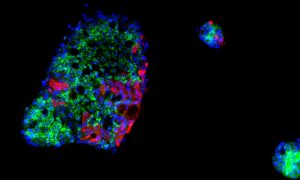
EMBL scientists, together with collaborators from Heidelberg University, have provided further evidence of the gut’s role in COVID-19.
SCIENCE & TECHNOLOGY
2021
sciencescience-technology
22 April 2021
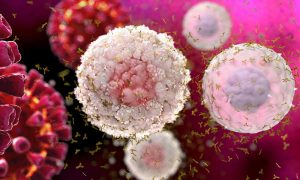
Researchers identify differences in immune response in asymptomatic COVID-19 cases compared to those with severe symptoms
SCIENCE & TECHNOLOGY
2021
sciencescience-technology
20 April 2021
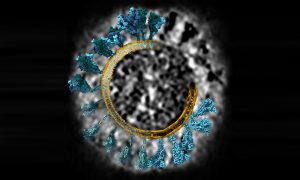
What does coronavirus’s spike protein look like in 3D? EMBL scientists and colleagues used cryo-electron tomography and molecular dynamics simulations to find out.
SCIENCE & TECHNOLOGY
2021
picture-of-the-weekscience-technology
16 February 2021
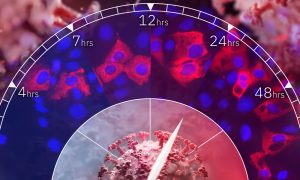
A team of EMBL scientists and colleagues have analysed how the novel coronavirus affects proteins in human cells. They identified several human proteins as potential drug targets to prevent viral replication.
SCIENCE & TECHNOLOGY
2021
sciencescience-technology
9 February 2021
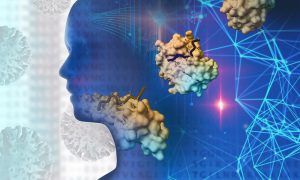
Researchers at EMBL Heidelberg have identified sequences in human proteins that might be used by SARS-CoV-2 to infect cells. They have discovered that the virus might hijack certain cellular processes, and they discuss potentially relevant drugs for treating COVID-19.
SCIENCE & TECHNOLOGY
2021
sciencescience-technology
4 February 2021

Open letter galvanises life science community in support of open COVID-19 data
EMBL ANNOUNCEMENTSLAB MATTERS
2021
embl-announcementslab-matters
3 February 2021

A new lineage of coronavirus was first identified in the UK, but why is it spreading much more rapidly within the population?
SCIENCE & TECHNOLOGY
2021
sciencescience-technology
20 January 2021

A note on the coronavirus variant B.1.1.7, which has first been described in the U.K. and has spread to 57 countries. The note summarises epidemiological information about the spread of B.1.1.7 in the U.K. collated and in part conducted by researchers from EMBL-EBI.
SCIENCE & TECHNOLOGY
2021
sciencescience-technology
19 January 2021
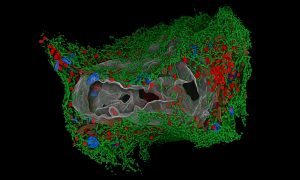
It’s almost a year since the coronavirus outbreak was declared a pandemic, affecting all our lives. While the virus continues its grip on the world, scientists are understanding it better and better, increasing our knowledge about it and opening up new ways to fight it.
SCIENCE & TECHNOLOGY
2021
picture-of-the-weekscience-technology
1 December 2020
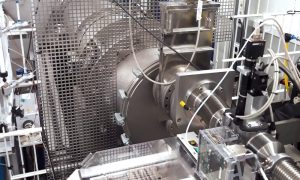
Biotechnology company BioNTech and Johannes Gutenberg University Mainz conduct collaborative research with EMBL scientists at the beamline P12 in Hamburg
SCIENCE & TECHNOLOGY
2020
sciencescience-technology
23 November 2020
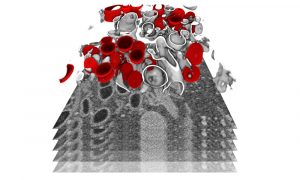
Researchers have studied SARS-CoV-2 replication in cells and obtained detailed insights into the alterations induced in infected cells. This information is essential to guide the development of urgently needed therapeutic strategies for suppressing viral replication and induced pathology.
SCIENCE & TECHNOLOGY
2020
sciencescience-technology
4 November 2020

By screening hundreds of sybodies (synthetic mini-antibodies), scientists have identified one that might stop SARS-CoV-2 from infecting human cells. This work, which holds promise for treating COVID-19, was conducted by EMBL Hamburg and collaborators from the Centre for Structural Systems Biology…
SCIENCE & TECHNOLOGY
2020
sciencescience-technology
20 October 2020

Open access data benefits millions of scientists around the world and is essential for a rapid response to the COVID-19 pandemic.
SCIENCE & TECHNOLOGY
2020
sciencescience-technology
15 October 2020
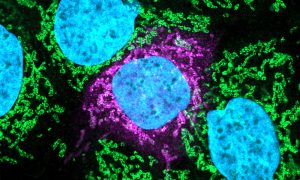
Scientists from the Beltrao Group at EMBL-EBI and collaborators identified drug targets common to SARS-CoV-2, SARS-CoV-1, and MERS-CoV, three pathogenic coronaviruses. They also found potential drugs that could be repurposed as COVID-19 treatments, and against emerging coronavirus strains in the…
SCIENCE & TECHNOLOGY
2020
sciencescience-technology
17 July 2020

European collaboration receives funding to explore risks and impact of future infectious disease outbreaks.
LAB MATTERS
8 July 2020

The virtual EMBL Conference ‘SARS-CoV-2: Towards a New Era in Infection Research’ explored the importance of fundamental research, collaboration, and data science in containing the SARS-CoV-2 pandemic, and discussed opportunities to improve our response to pandemics in the future.
SCIENCE & TECHNOLOGY
2020
eventsscience-technology
29 June 2020
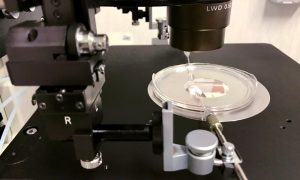
To study how SARS-CoV-2 infects cells, the Gene Editing and Embryology Facility (GEEF) at EMBL Rome will generate mice that express a human version of a protein called ACE2. The mouse line will be shared with preclinical research collaborators carrying out vaccine and antibody trials, and with the…
SCIENCE & TECHNOLOGY
2020
sciencescience-technology
29 June 2020
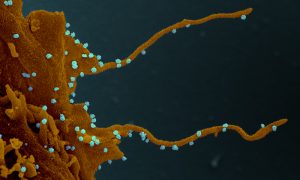
Researchers evaluate how the new coronavirus rewires human proteins for its own replication, and identify several antiviral drugs ready for clinical trials
SCIENCE & TECHNOLOGY
2020
sciencescience-technology
25 June 2020
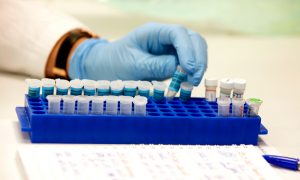
EMBL scientists develop a new molecular tool to prevent SARS-CoV-2 infection in mice. This tool is able to cause targeted epigenetic modifications of specific genes in specific cell populations. They will use it in mice to target airway cells that express the ACE2 protein – the receptor that…
SCIENCE & TECHNOLOGY
2020
sciencescience-technology
22 June 2020
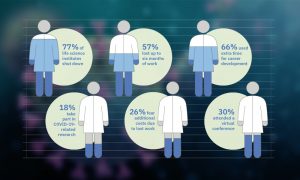
Jan Korbel and Oliver Stegle have performed a survey of fellow life scientists to learn how the current crisis, with partial or complete institutional shutdowns, is affecting their work.
LAB MATTERSSCIENCE & TECHNOLOGY
2020
lab-mattersscience-technology
17 June 2020
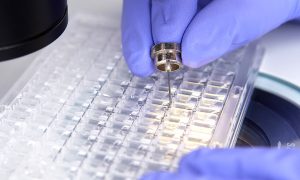
While global research on coronaviruses has shed light on the function of many SARS-CoV-2 proteins, the role of some crucial components remains unknown. Researchers at EMBL Grenoble will use a range of structural biology methods to try to solve some of the puzzles of the molecular mechanics of…
SCIENCE & TECHNOLOGY
2020
sciencescience-technology
16 June 2020
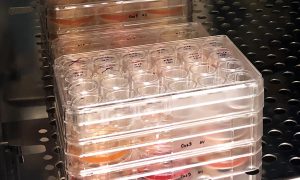
Scientists at EMBL and Heidelberg University Hospital are studying how the novel coronavirus behaves in the gut to try to better understand its epidemiology and prevent its spread. To do this, they are combining advanced imaging and sequencing technologies to study coronavirus in human intestinal…
SCIENCE & TECHNOLOGY
2020
sciencescience-technology
15 June 2020

The emergence of previously unknown pathogens, such as the novel coronavirus SARS-CoV-2, raises many questions. To explore these questions in an international scientific forum, EMBL will host the virtual conference ‘SARS-CoV-2: Towards a New Era in Infection Research’ on 3 July. Invited…
EMBL ANNOUNCEMENTS
2020
embl-announcementsevents
9 June 2020
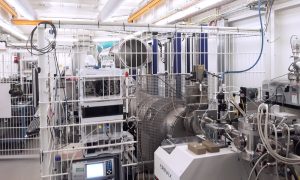
EMBL researchers are studying COVID-19-related molecules by exposing them to high-brilliance X-ray beams. The Svergun group at EMBL Hamburg is using biological small-angle X-ray scattering (SAXS) as part of a global effort by scientists to elucidate the structural organisation of SARS-CoV-2…
SCIENCE & TECHNOLOGY
2020
sciencescience-technology
27 May 2020
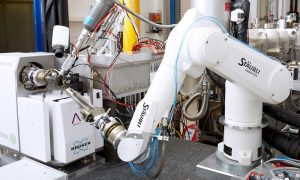
EMBL and the European Synchrotron Radiation Facility (ESRF) restart the activities of the Joint Structural Biology Group in Grenoble to support coronavirus-related projects. A new initiative will allow users to be granted access to the High-Throughput Crystallisation (HTX) lab at EMBL and to a…
CONNECTIONS
26 May 2020

EMBL scientists have performed a large-scale analysis of over 4700 SARS-CoV-2 genome sequences. They found that many of the most interesting changes in the SARS-CoV-2 genome that have been reported so far are likely to be technical artefacts, rather than biological mutations.
SCIENCE & TECHNOLOGY
2020
sciencescience-technology
22 May 2020
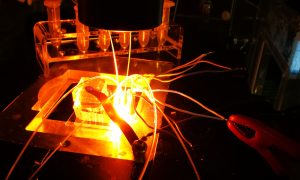
Scientists hope that a legacy of the novel coronavirus in recovered COVID-19 patients – antibodies in their blood – could lead to drugs to treat others. The Merten group at EMBL Heidelberg has pivoted its microfluidics platform to support the search for neutralising antibodies that could…
SCIENCE & TECHNOLOGY
2020
sciencescience-technology
13 May 2020

EMBL scientists will contribute to the new German COVID-19 OMICS Initiative to study the biological mechanisms contributing to coronavirus infections. EMBL group leaders Jan Korbel and Oliver Stegle, who is also affiliated with the DKFZ Heidelberg, will coordinate the set-up of IT infrastructures…
SCIENCE & TECHNOLOGY
2020
sciencescience-technology
11 May 2020
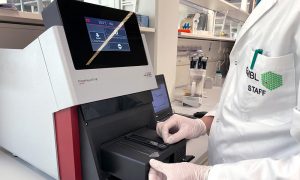
The Sample Preparation and Characterisation Facility (SPC) at EMBL Hamburg reopens to support scientists working on Covid-19 research. The SPC Facility is one of the best equipped facilities in Europe is therefore in high demand from external users. Re-opening the facility also allows experts at…
SCIENCE & TECHNOLOGY
2020
sciencescience-technology
5 May 2020
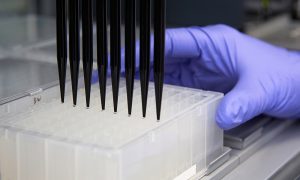
By re-opening the High-Throughput Crystallisation (HTX) lab at EMBL Grenoble, EMBL is supporting structural biology projects to respond to the health threats posed by coronaviruses.
SCIENCE & TECHNOLOGY
2020
sciencescience-technology
30 April 2020
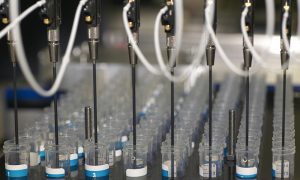
The Marquez Team has restarted operations at the High-Throughput Crystallisation (HTX) lab at EMBL Grenoble. The team has developed a fully automated protein-to-structure pipeline, which can be operated remotely and provides virtual access to the facilities.
SCIENCE & TECHNOLOGY
2020
sciencescience-technology
30 April 2020
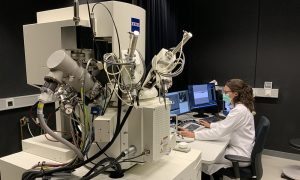
EMBL electron microscopy specialists collaborate with researchers from Heidelberg University Hospital to understand the changes occurring in cell structures upon SARS-CoV-2 infection.
SCIENCE & TECHNOLOGY
2020
sciencescience-technology
28 April 2020
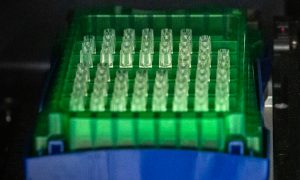
Scientists at EMBL Hamburg and Karolinska Institutet Stockholm aim to find synthetic antibodies – known as nanobodies – that bind a surface protein of the novel SARS-CoV-2 coronavirus. Nanobodies could prevent the virus from entering human cells and causing COVID-19.
SCIENCE & TECHNOLOGY
2020
sciencescience-technology
27 April 2020
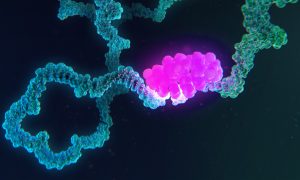
EMBL scientists working in the groups of Matthias Hentze and Wolfgang Huber have created RBPbase – a database of RNA-binding proteins – to assist the identification of proteins that interact with the SARS-CoV-2 RNA genome.
SCIENCE & TECHNOLOGY
2020
sciencescience-technology
24 April 2020

In March 2020, planes were grounded, streets went quiet, and our lives changed forever. But while the world came to a halt, many scientists were ramping up their efforts to understand the new virus.
SCIENCE & TECHNOLOGY
2020
sciencescience-technology
20 April 2020

The new collaborative space will help scientists, public health and healthcare professionals around the world to fight the coronavirus pandemic.
SCIENCE & TECHNOLOGY
2020
sciencescience-technology
17 April 2020

EMBL Heidelberg reopens the Cryo-Electron Microscopy Service Platform to support coronavirus structural biology research.
CONNECTIONS
16 April 2020

Scientists at EMBL Heidelberg are contributing their expertise in a community effort to develop large-scale testing methods for coronavirus. Their goal is to increase the capacity and speed of testing, which is crucial for containing the pandemic.
SCIENCE & TECHNOLOGY
2020
sciencescience-technology
15 April 2020
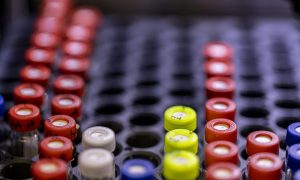
EMBL researchers are studying how drugs that have shown good results against COVID-19 work in living cells
SCIENCE & TECHNOLOGY
2020
sciencescience-technology
15 April 2020

The Protein Expression and Purification Core Facility at EMBL Heidelberg will produce proteins for several coronavirus-related research projects, to assist the development of new strategies to fight the virus.
SCIENCE & TECHNOLOGY
2020
sciencescience-technology
9 April 2020

EMBL Director General Edith Heard responds to the resignation of the President of the European Research Council (ERC)
EMBL ANNOUNCEMENTSLAB MATTERS
2020
embl-announcementslab-matters
27 March 2020

EMBL-EBI set to launch European COVID-19 Data Platform to help store, share, and analyse research data linked to the COVID-19 pandemic.
SCIENCE & TECHNOLOGY
2020
sciencescience-technology
25 March 2020

EMBL is committed to providing a safe and healthy working environment for our staff and visitors.
EMBL ANNOUNCEMENTSLAB MATTERS
2020
embl-announcementslab-matters
6 January 2013
A research team of scientists from EMBL Grenoble and the IGBMC in Strasbourg, France, have, for the first time, described in molecular detail the architecture of the central scaffold of TFIID: the human protein complex essential for transcription from DNA to mRNA. The study, published today…
SCIENCE & TECHNOLOGY
2013
sciencescience-technology
No results found



















































